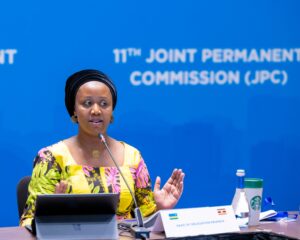
Mending Shaky Trade Ties but Can East African Nations Rise above Typical Diplomatic Talk
By Muoki Musila
Mending Broken Trade Relations
Rwanda and Uganda set out to evaluate their areas of strategic cooperation and the implementation status of the past agreements during the 11th Joint Permanent Commission (JPC) session held in Kigali between 22-24 March 2023. The meeting comes after a long period of tensions between the two countries that have impacted trade creating unnecessarily long supply chains to the disadvantage of the East African citizens. While the 11th JPC is indicative of the intention between the two nations to revitalize relations and deepen trust, questions are emerging on whether the right discussions are being prioritized. Convening for the first time in more than 10 years, the agenda is indicative of the dysfunctions that ail regional integration and the formation of a single market for the East African community.
This comes at a time when other neighbors, Tanzania and Kenya, are locked in a continuous loop of trade rows that have negatively impacted trade. Kenya has agreed to clear Konyagi Spirit and Timber from Tanzania held at its borders in exchange for tea exports into Tanzania during the 8th Joint Trade Committee (JTC) meeting between the two nations. With the eldest members of the bloc experiencing continuous tiffs, the EAC is setting a worrisome precedence for newer and aspiring member nations.
Observers feel that engagement between nations in the bloc has increasingly prioritized shows of political might with critical business and integration efforts shoved to a distant second. For tangible gains, East African nations must commit to ending the continuous tiffs, engage in meaningful dialogue, and take tangible action.
A Bloc of Cold Wars
The border between Rwanda and Uganda opened in January 2024 after its closure in 2019 following rising tensions amidst COVID-19-fueled disagreements marking years of stalled trade activities. Relationships between the two nations had been strained by mutual accusations of spying, kidnapping, and support for rebels. Traders across the two nations still accuse either country of cherry-picking products to allow across borders with longer hours spent at the border despite the existence of one-stop-border points. Despite the provisions of the East Africa Customs Union, trade between the two nations is characterized by unpredictability in trade rules, and selective standards and rules continue to inhibit relationships between the two nations.

The 11th JPC focused on justice and constitutionalism, mutual legal assistance, diplomatic and political issues, and migration issues that are painfully a thorn in the region’s flesh. However, as is characterized by such relations the world over, the two nations did little to shed accusations of prioritizing bravado and chest-thumping in typical diplomatic discussions. With traders suffering considerable losses and pushing the costs of longer supply chains to consumers, East African nations cannot afford to prioritize politics over economic necessities.
Tanzania and Kenya have in the past been equally engaged in Cold War spats impacting trading activities across the borders with goods detained on either side of the border. Accusations traded between the nations, including increased cost of export permits, selective law and standards, and confiscation of products, are an indication of urgent calls for nations to prioritize trade rules harmonization. The holistic harmonization of levies, fees, and charges and the commitment to strengthen is a matter of urgency for the region to advance economically.
“Bilateral and regional talks should prioritize issues that benefit all member states, including infrastructure development, joint resource management, and fostering regional trade and integration.”
These hiccups can be attributed to several factors, most prominently the ongoing political and diplomatic tensions between member states. Issues of border security, trade disputes, and accusations of interference in internal affairs have created a climate of mistrust that hinders cooperation. Additionally, a lack of political will and commitment from some member states in the region has hampered the full implementation of agreed-upon protocols.
Sustaining Resolutions for Mutual Benefit
To overcome these hurdles and achieve the true potential of the EAC, a paradigm shift is necessary. Member states must prioritize dialogue and diplomacy over confrontation. While regular high-level meetings like the Joint Permanent Commission are crucial, they need to be more than just formalities. Open and honest communication between leaders is essential for addressing grievances and fostering trust.
The EAC’s vision of a prosperous, peaceful, and politically stable region under a single economic market serves as a powerful unifying force. Bilateral and regional talks should prioritize issues that benefit all member states, including infrastructure development, joint resource management, and fostering regional trade and integration. Non-tariff barriers, such as bureaucratic red tape and delays at border crossings, are still a significant hindrance to intra-regional trade. Harmonization of regulations, streamlining customs procedures, and adopting technological solutions can significantly improve trade flow.
Thinking of the Citizen
Notably, the participation of affected citizens, including the private sector in such high-level meetings is still limited and treated with contempt. The success of the EAC hinges on the active participation of its citizens. Regular consultations with civil society, the private sector, and academia are essential for ensuring policies reflect the needs and aspirations of the people.
The citizens of the EAC deserve to live in a region where borders are open, trade flourishes, and opportunities abound. Leaders must rise above their differences and commit to genuine dialogue and action. The countless meetings and summits must translate into tangible progress on the ground. The EAC has the potential to be an economic powerhouse, a beacon of peace, and a symbol of African unity. However, this potential can only be realized if member states choose cooperation over confrontation.
Muoki Musila is an Kenyan based economist. These are the writer’s own opinions and do not necessarily reflect the viewpoints of Liberty Sparks. Do you want to publish in this space? Contact our editors at [email protected] for further clarification.



